Evaluation

Evaluation stage has a lot of importance in the democratic regimes. It has two principals’ goals: accountability and learning.
There can exist plenty of methods to evaluate policies. Most methods try to combine quantitative and qualitative analysis. Evaluation usually focuses on a single piece of legislation or individual project and the objectives Is overseeing if it achieves certain policy goals or not. However, evaluations are interested not only in the policy outputs and impacts, but in taking the policy making process as an equally valid object of study.
The evaluation has a lot of importance for the European Commission. The Commission is non-elected and evaluation may be a good idea to justify the worth of their activities. At the EU level we can find quite policy stakeholders.
For instance, The Committee or Regions and the European Economic and Social Committee seek to evaluate and monitor not only the policy content, but also the policy-making process. And another important stakeholder is the European Court of Auditors which is very active in evaluating procedures and conduct concerning the spending of the EU budget. Finally DGs contain a handful of desk officers, with few real evaluation experts in-house.
From a theoretical perspective we can find three types of evaluation. 1) Administrative evaluation. Examines efficiency, the achievement of priorities and goals, managerial performance or the respect of democratic procedure. 2) Political evaluation. Attempts to label a policy as a success or failure based on preferences and ideology often with calls for termination or change. It is not systematic or technically sophisticated and these can produce biases. 3) Judicial evaluation. Examines issues related to how programmes are implemented, assesses legality of government action and codes of administrative conduct.
To improve your knowledge we recommend:
Fitzpatrick, J., Christie, C. and Mark, M.M. (2009) Evaluation in Action. Interviews with experts evaluators (London: Stage)
Rossi, P.H., Lipsey, M.W. and Freeman, H.E. (2004) Evaluation. A systematic approach, 7th edn (London: Stage)
Stern, E. (2009). Evaluation policy in the European Union and its institutions. New Directions for Evaluation, 1(123), 67-85. DOI: https://doi.org/10.1002/ev.306
